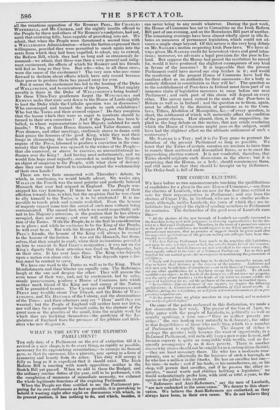WHAT IS THE DUTY OF THE EXPIRING PA RLI AM
EN T ?
THE only duty of a Parliament on the eve of extinction till it is revived in a new shape, is to do every thing, as rapidly as possible, necessary for its approaching reanimation,—to arrange its funeral pyre, so that its successor, like a phamix, may spring in a form of symmetry and beauty from its ashes. This duty will occupy it fully as long as it is expedient that it should exist. The Irish Reform Bill is meeting with much opposition; neither is the Scotch Bill yet passed. When we add to these the Budget, and the ordinary routine duties of the year, still to be performed, with the completion of measures of immediate necessity, we exhaust the whole legitimate functions of the expiring Parliament. When the People are thus entitled to see the Parliament pre- paring for its own euthanasia as fast as possible, it is provoking to behold it wasting night after night on discussions with which, in its present position, it has nothing to do, and which, besides, it can never bring to any result whatever. During the past week, the House of Commons has sat in Committee on the Irish Reform Bill part of one evening, and on the Boundaries Bill part of another. The remaining evenings have been almost wholly spent in idle de- bates on measures of permanent legislation, which could not ad- vance a single stage beyond. Of this nature is the very long debate on Mr. SADLER'S motion respecting Irish Poor-laws. We have al- ways given Mr. SADLER credit for benevolent views and good inten- tions; moreover, we advocate a legal provision for the poor in Ire- land. But suppose the House had passed the resolution he moved for, would it have produced the slightest consequence of any kind in favour of the measure ? It is impossible that the present Parliament could have moved one step farther in it ; and would the resolution of the present House of Commons have had the smallest effect as an authority for their successors—for a body so entirely different in constitution as they will be? The question as to the establishment of Poor-laws in Ireland must form part of an immense chain of legislative measures to come before our next Parliament ; and each part of this chain will depend on every other. The survey must extend to the state of the Poor-laws in Britain as well as in Ireland ; and the question as to them, again, must be affected by the decision of questions as to the Corn- laws, Tithes, Abolition of Monopolies, &c.—of every question, in short, the settlement of which will materially affect the condition of the poorer classes. How absurd, then, is the supposition, im- plied in the long debate on this matter, that any crude resolution which the House of Commons might pass on the subject, could have had the slightest effect on the ultimate settlement of such a controversy Mr. SADLER is a Tory; and it is the Tory game to protract the duration of the present Parliament as. long as possible. We know that the Tories of certain counties are anxious to have time to reunite their scattered and discomfited forces, so as to meet the approaching election contest. It is not wonderful, therefore, that Tories should originate such discussions as the above; but it is surprising that the House, as a body, should countenance them, and still more so that they should be brought on by Reformers. The Order-book is full of them.



























 Previous page
Previous page